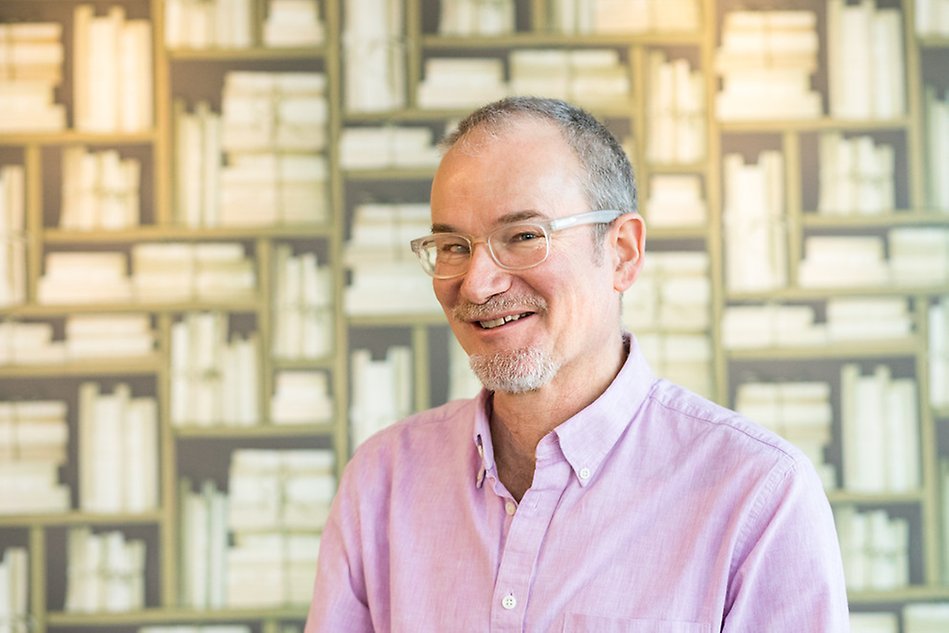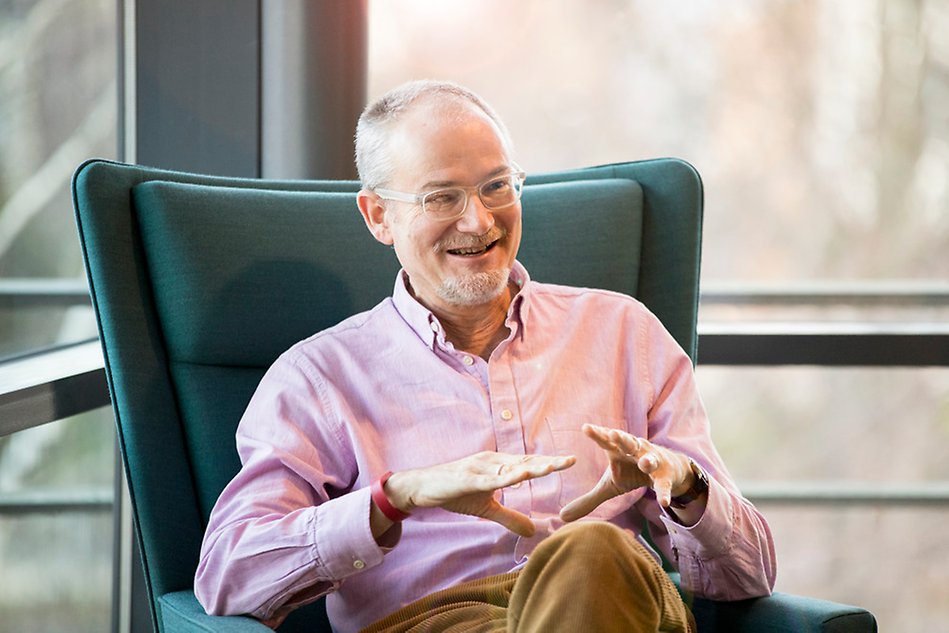The challenge with healthcare innovation
“There is no shortage of innovation within the healthcare sector, it’s just translating innovation into practice that is difficult. And it takes a long time”, says Guest Professor James Barlow, the second Bennett Professor at Halmstad University. He is a Professor in Technology and Innovation Management at Imperial College Business School in London and focuses in his research on innovation in healthcare – from creation to adoption. He is particularly interested in the complex relationship between innovation in health technologies, services and infrastructure.

James Barlow has been a Professor of Technology and Innovation Management at Imperial College Business School since 2003. He is a Guest Professor and the second Bennet Professor at Halmstad University. The Guest Professorship, which started in July 2018 and will continue for three years, is strongly connected to Halmstad University Research for innovation and Health Innovation profile area. James Barlow is involved in a number of multidisciplinary research projects at Halmstad University.
”It doesn’t matter what health system you are in, whether it’s a northern European public and socially funded one, or if it’s an American insurance based system. It is always difficult to adopt health care innovation.”
James Barlow
”We know that there is a gap between growing care needs and shrinking available resources to meet them, and that innovation has to be part of the solution to bridging this gap. New technology is not the problem – there is no shortage of health innovations. The challenge is to integrate the innovations in the existing healthcare ecosystem which is complex, highly politicised, difficult to handle and hard to predict.”
James Barlow’s experience is that innovation in the healthcare sector is difficult all over the world.
”It doesn’t matter what health system you are in, whether it’s a northern European public and socially funded one, or if it’s an American insurance based system. It is always difficult to adopt healthcare innovation”.
A better entrepreneurial culture
According to James Barlow, the solution is to bring together the different care organisations and develop more integrated care models. And since implementing a new health innovation often involves extra costs, it may need to be supported by a central organisation, like a government, rather than burdening a specific care organisation. It is also important to make it possible for care providers to develop and implement their own solutions, so that new innovations are given the best possible chance to be adopted widely.
”We need to create a more entrepreneurial and innovative culture within healthcare organisations to encourage doctors, nurses and other healthcare workers to be innovative and come up with new ideas. Or if they find a new idea that they want to try out, give them the time and permission to do it. Don’t penalise people if they try something out which doesn’t work”, says James Barlow.

James Barlow sees the potential in Halmstad University and the research within health innovation, and is looking forward to collaborating with his new colleagues. “For example, I’m developing a project together with Fábio Gama at the School of Business, Engineering and Science at Halmstad University on the lessons from a global collaboration to develop solutions for the Zika virus.”
Data driven healthcare has to be combined with organisational change
“There is lots of talk about the potential of artificial intelligence and new medical technologies to revolutionise healthcare. The reality is that these will only work when combined with organisational or process changes. But there is huge potential in the new data technologies to allow us to create innovative models of care, and then test them out through modelling to confirm whether they might work or not”, says James Barlow.
James Barlow’s connections with Sweden date back to 1986, when he spent several years researching and writing about the Swedish housing and construction industry. More recently, he was involved in a research project on telehealth for older people in Sweden.
“I’ve visited Sweden many times during my career and it’s great to be working with the group in Halmstad on new research ideas”
Looking forward to collaborating with new colleagues
James Barlow sees the potential in Halmstad University and the research within health innovation, and is looking forward to collaborating with his new colleagues.
“For example, I’m developing a project together with Fábio Gama at the School of Business, Engineering and Science at Halmstad University on the lessons from a global collaboration to develop solutions for the Zika virus.”
James Barlow is also involved in a project together with Halmstad researchers Jeaneth Johansson, Pia Ulvenblad and Anders Billström about university spin-outs.
“We are looking at technology transfers from universities to entrepreneurial start-ups. The idea is to study a local innovation ecosystem, for example Halland, to see how they are organised and how effective they are in comparison to other ecosystems“, says James Barlow.
Text: Louise Wandel
Photo: Ida Fridvall
About James Barlow
James Barlow has been a Professor of Technology and Innovation Management at Imperial College Business School since 2003. Other posts include the Science Policy Research Unit (SPRU), University of Sussex, and the Policy Studies Institute. His current roles include Associate Director of Research for Imperial College Health Partners and President of the International Academy for Design and Health. He is also a member of Deloitte’s health innovation advisory committee.
James Barlow’s first degree was in Geography and he holds a PhD in Economics. Since the late 1990s his research has focused on innovation in healthcare – from creation to adoption. He has led or been involved in many research projects and has published widely. He also has extensive experience providing advice and consultancy to the British government and industry, both in the UK and elsewhere. Current research includes work on the development and adoption of genetically modified mosquitoes for malaria eradication, work on the de-adoption and re-adoption of home haemodialysis technology, and an evaluation of the pharmaceutical industry’s response to antimicrobial resistance.
James Barlow is a Guest Professor and the second Bennet Professor at Halmstad University. The Guest Professorship, which started in July 2018 and will continue for three years, is strongly connected to Halmstad University Research for innovation and Health Innovation profile area. James Barlow is involved in a number of multidisciplinary research projects at Halmstad University.
About the Bennet Professorship
Since 2014, Carl Bennet AB has contributed funds to finance a professor at Halmstad University, called the Bennet professorship. Holders of the Bennet Professorship can either be an international guest professor who works at Halmstad University or a professor who is temporarily employed and has a professorship for a period of three years. Since July 2018, Guest Professor James Barlow holds the Bennet Professorship.
About Research for innovation
Halmstad University has two profile areas: Health Innovation, and Smart Cities and Communities – and three areas with the right to award doctorates: Information Technology, Innovation Sciences and Health Sciences. The profile areas are the base for the Knowledge Foundation – Environment called Research for Innovation.
Halmstad University is one of five universities in Sweden that has qualified to be a Knowledge Foundation – Environment, which was granted by the Swedish financer for universities. This means that the foundation, on a long-term basis, invests in the University's key areas. Crucial to all research projects within the Knowledge Foundation – Environment is the collaboration with business and commerce, known as co-production. This usually means that companies are engaged in research projects together with the University's researchers and account for part of the financing.
The environment is called Research for Innovation since Halmstad University's profile is The Innovation-Driven University.


